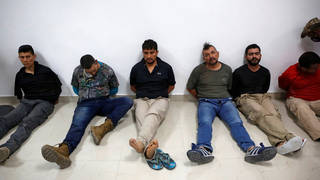Colombia's Export of Mercenaries Scrutinized After U.S.-Trained Soldiers Kill Haiti's President

The role of Colombian mercenaries in the assassination two weeks ago of Haitian President Jovenel Moise has come under scrutiny after The Washington Post reported some of the Colombians received U.S. military training while they were part of the Colombian armed services. One of the mercenaries has been identified as former special commando Grosso Guarin, who was once assigned to a secretive elite military detachment of Colombia's Urban Anti-Terrorist Special Force group that carried out kidnappings and assassinations. Another Colombian mercenary arrested in Haiti was Francisco Eladio Uribe Ochoa, who was once investigated for his role in executing civilians in Colombia and then disguising them as combatants - a practice known as false positives. The Colombian military has been accused of killing over 6,400 civilians in this way. Joining us from Bogota, Colombia, reporter Mario Murillo says the involvement of Colombian mercenaries stems from the hyper-militarization of the country," rooted in decades-long counterterrorism and counternarcotics operations that have doubled the size of the Colombian military. We're talking about thousands of soldiers who have been going around the world," he says, calling them highly trained artists of war."